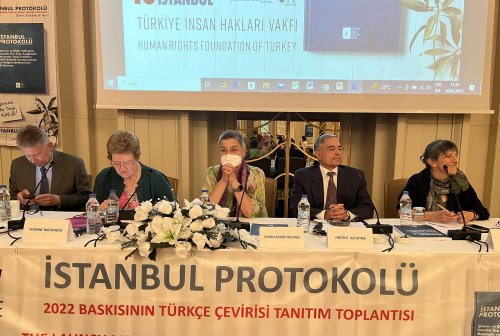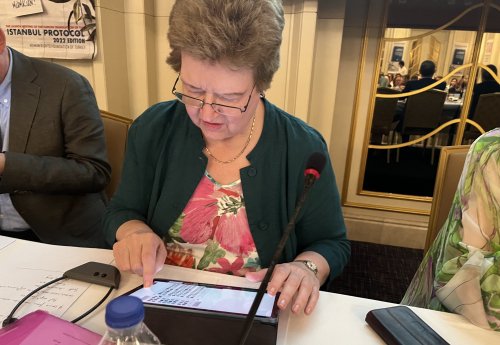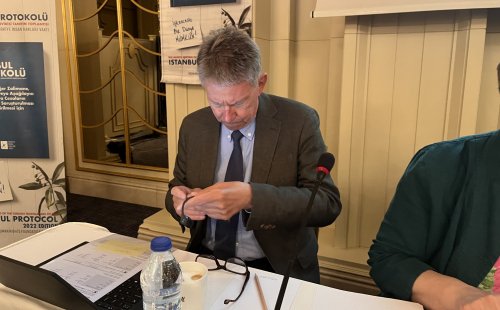Click to read the article in Turkish
"Torture affects and transforms not only the person who is subjected to it but also her/his immediate circle and the whole of society."
"Torture methods reemerge and are repeated in societies periodically."
"Human rights have been marginalized further in the last 10 years."
"There are improving principles in the İstanbul Protocol about investigative interviewing that will assist policemen in interviewing the suspects and not torturing them."
An international event organized by the Human Rights Foundation of Turkey (TİHV) to introduce the Turkish translation of the Istanbul Protocol: Manual on the Effective Investigation and Documentation of Torture and Other Cruel, Inhuman or Degrading Treatment or Punishment was held in İstanbul on Saturday (June 10).
The manual, which is also referred to as the İstanbul Protocol, was updated last year with the participation of more than 180 experts from 51 countries.
"Torture methods reemerge periodically"
bianet interviewed Dr. Jens Modvig, the former chairperson of the UN Committee Against Torture, and Dr. Vivienne H. Nathanson, the chairperson of the Voluntary Fund for Victims of Torture before the event.

Dr. Vivienne H. Nathanson expresses that torture affects and transforms not only the person who is subjected to it but also her/his immediate circle and the whole of society.
Nathanson said that torture methods reemerge and are repeated in societies periodically, and speaking about the global trends, for instance, disappeared persons again started to be used as a method.

"We know that different kinds of violations of human rights are widespread in Turkey," she said and added that they have documents and reports about torture realized in prisons and detention centers. "We observe that throughout the world not only torture but many forms of human rights violations occur. And mostly against minorities and LGBTİ+ individuals... In some countries people are executed because they are gay," Nathanson said.
"Human rights marginalized in the last 10 years"
Dr. Nathanson underlined that they, as doctors, have to stand against all kinds of discrimination. She believes that discrimination makes the individuals and the society less tolerant, and less polite and it harms the society.
"We see that human rights are marginalized further in the last 10 years, with less importance attached to them. The worst affected are the displaced people, the migrants," she said and added that the migrants are being forced to do the jobs that nobody wants to do and to contribute to the countries to get richer but that they are subjected to discrimination at the same time.
Vivienne H. Nathanson underlines that the most important foundation that they wish to build for the future is solidarity in society.
"As doctors, nurses, and other healthcare workers, we unite in the whole world for those who are subjected to rights violation. It is very important that national organizations also help international organizations," she said.

Dr. Jens Modvig, the former chairperson of the UN Committee Against Torture, now continues to work at Dignity – Danish Institute Against Torture.
"I have been Chairperson of the UN Committee Against Torture and of course committee reviews all the states, including Turkey. They reviewed Turkey in 2016/2018 and issued some recommendations to improve human rights. Of course, there are issues in Turkey, for instance, the cases against medical doctors and medical associations... These cases are unacceptable," he said, addressing the event.
"Protocol will contribute to improving human rights"
"I'm very happy about the İstanbul Protocol now being available in Turkish. İstanbul Protokol is extremely important against torture, not only for medical doctors but also lawyers and the human rights community in Turkey. I'm very pleased to be here, in the mother city of the protocol. I'm sure the protocol in the Turkish language will contribute to the improvement of human rights," Modvig added.
"I'm a born optimist. I think that even if there are steps back, there are also steps forward. It is a very complex issue if we are improving or deteriorating with regard to human rights... I believe that in the long run, we are making progress. Because we are improving standards, and we have international tools...
"Of course, there are steps back and there are still big torture problems in the world we have not managed to eliminate, but my personal opinion is that there are some good steps ahead. We have other improving principles in the İstanbul Protocol about investigative interviewing that will assist policemen in interviewing the suspects and not torturing them. I still think that things are improving although sometimes it's two steps ahead and one step back..." (AS/PE)





.jpg)




